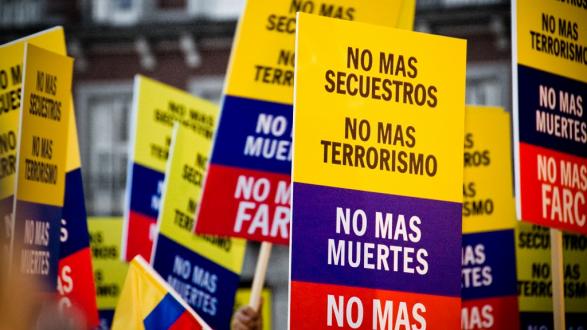In:
Global Beat is your weekly stop for news from around the world. Join us every Friday morning for important stories you should know about.
This week, Colombians reject a peace deal between the government and FARC rebels; protests in Poland force the government to drop a controversial anti-abortion bill; European countries consider sanctions against Russia over Aleppo violence; and more.
____________________
Americas
By less than half a percentage point, Colombians voted this week to reject a proposed peace deal with the FARC, an armed insurgency group that has battled the government for 52 years. The deal would have given FARC members who confessed to their crimes lighter sentences and paid demobilized rebels a stipend. FARC would also have been given 10 guaranteed seats in congress in 2018 and 2022. Colombians who voted "No" argue that this would have amounted to rewarding criminal and violent behavior. Both Colombian President Juan Manuel Santos and leaders of the FARC have vowed to continue working towards peace. Santos received the Nobel Peace Prize on Friday for pursuing the deal.
Also check out:
- Coffee producers in Costa Rica use science to tackle climate change – Diego Arguedas Ortiz, Inter Press Service
Central & South Asia
More than 70 governments convened in Brussels Wednesday to raise aid money for Afghanistan. $15 billion were pledged to help fund the country for the next four years, under the condition that Afghanistan sign various political, social, and economic reforms. The European Union has focused on rejuvenating the stalled peace process between the Taliban and the Afghan government and bringing regional groups together to discuss reconciliation. The EU and Afghanistan have also announced a controversial new deal to repatriate thousands of rejected Afghan asylum seekers in Europe, though EU Foreign Policy Chief Federica Mogherini stated that there is no link between development aid and migration policy.
Also check out:
- Pakistan stiffens penalty for ‘honor’ killers – Kathy Gannon, Associated Press
China & East Asia
A study conducted in China by the Pew Research Center found that while half of respondents held a favorable view of the United States, 45 percent also stated that U.S. influence is the leading international threat to China, above economic instability and the Islamic State. The Chinese also expressed concern with water and air pollution, with more than 70 percent considering them "moderately big" problems. Three-quarters of respondents see China playing a more important role in world affairs than 10 years ago, but roughly the same number said their way of life needs protection from foreign influence and Chinese leaders should focus on domestic challenges.
Also check out:
- North Korean official who supplies medicine to Kim Jong-un defects – Agence France-Presse
Europe & Russia
Poland’s right-wing government has softened its stance on a controversial citizen’s bill banning all abortion except if there is a risk to the mother’s life. The bill, drafted by hardline anti-abortion group Ordo Iuris and backed by the Catholic Church, also included jail time for women found to have had abortions and doctors who performed the procedure. Over 100,000 women protested the bill throughout Poland’s major cities on Monday, leading Prime Minister Beata Szydlo to state that the "government is not working on any legislation changing the rules on abortion in Poland."
Also check out:
- United Nations Security Council says António Guterres is its unanimous choice for secretary-general – Krishnadev Calamur, The Atlantic
Middle East & North Africa
European leaders are considering different options to stop the violence in Syria after the failure of the U.S.-Russian ceasefire. Germany’s government is weighing a push for EU sanctions against Russia following accusations that the Russian military bombed hospitals and other civilian targets in Aleppo. French Foreign Minister Jean-Marc Ayrault is traveling to Russia and the United States to attempt to convince the two powers to accept a proposed Security Council resolution enacting a new truce in Aleppo, where a member of the UN High Negotiations Committee says violence has reached "genocidal proportions."
Also check out:
- Morocco puts itself at vanguard of solar revolution – Anmar Frangoul, CNBC
Southeast Asia & Oceania
Switzerland’s Office of the Attorney General has made another request for assistance from Malaysia during its lengthy investigation into 1MDB, a Malaysian state investment fund. The fund is under investigation by at least six other countries, including the United States, for allegedly misappropriating billions of dollars. Investigators believe that more than $1 billion dollars have been siphoned to the personal accounts of Najib Razak, the prime minister of Malaysia, and suspect a Ponzi scheme was used to cover up the misappropriation. The Malaysian attorney general has stated there is no evidence of wrongdoing.
Also check out:
- Papua New Guinea asks Australia for help resettling refugees from Manus Island – Ben Doherty, The Guardian
Sub-Saharan Africa
A newly released UNICEF-World Bank report found that half the children in sub-Saharan Africa live in extreme poverty. Sub-Saharan Africa was found to have both the highest rates of children living in extreme poverty (49%) and the largest share of extremely poor children (51%). Children are more likely than adults to experience extreme poverty, and are also more damaged by its effects, according to UNICEF Executive Director Anthony Lake. These living conditions can lead to stunted development, lack of future adult productivity, and the transmission of poverty between generations.
Also check out:
- Ethiopia and Djibouti have launched the first fully electrified cross-border railway line in Africa – BBC




